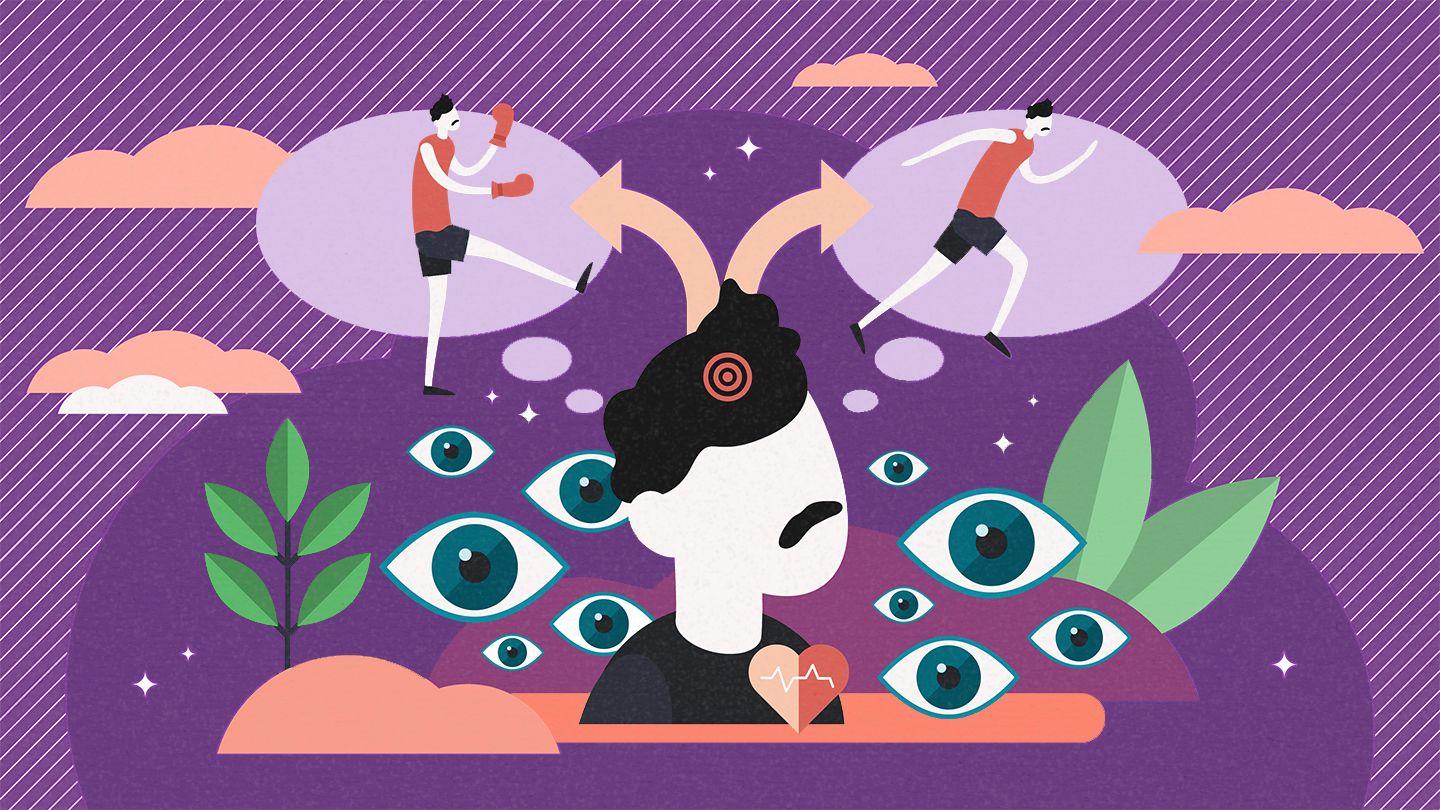Do you feel overwhelmed and constantly on edge? Are you having trouble sleeping or eating properly? If so, you may be suffering from stress. Stress is a common problem that can affect both your mental and physical health. It can cause a variety of symptoms, which makes it difficult to recognize and deal with. In this blog post, we will discuss the signs and symptoms of stress, as well as some tips for how to manage it.
Contents
What Is Stress?

Stress is your body’s way of responding to any kind of demand. It can be caused by both good and bad experiences. When people feel stressed by something going on around them, their bodies react by releasing chemicals into the bloodstream. These chemicals give people additional energy and strength, which can be a good thing if their stress is caused by physical danger. But this “fight-or-flight” response can also be harmful if it occurs too often or lasts too long, especially if people are not in danger.
Prolonged stress can have serious effects on a person’s health, including high blood pressure, heart disease, obesity, and diabetes. It can also lead to mental health problems such as anxiety and depression.
Types of Stress Symptoms

Stress is not always easy to recognize. The symptoms of stress can be physical, mental, or emotional. They can also be behavioral. You may not realize you are under stress because the symptoms often develop slowly over time. And you may not associate them with stress because they seem unrelated.
Physical Stress Symptoms
One of the main physical stress symptoms is a feeling of being constantly tense and on edge. You may feel like you are unable to relax, even when you are not doing anything. Other physical stress symptoms include:
Headaches
Headaches are very common, and stress is a major trigger. Tension headaches, the most common type, feel like a constant ache or pressure around the forehead or the back of the head and neck.
Sleep problems
Stress can make it hard to fall asleep or stay asleep. It can also cause you to wake up feeling tired and not well rested. You may find yourself lying awake at night worrying about things that are out of your control.
Muscle pain
People under stress often have muscular tension that causes pain in the neck, shoulders, and back. Stress can also lead to other types of muscle pain, such as cramps and fibromyalgia. Fibromyalgia is a condition that causes widespread muscle pain as well as fatigue, sleep problems, and mood issues.
Stomach problems
Stress can make you feel nauseous or cause vomiting and diarrhea. It can also lead to other digestive problems such as constipation or heartburn. If you have a history of stomach ulcers, stress can make them worse.
Changes in appetite
When you are under stress, you may lose your appetite or overeat. You may find yourself skipping meals because you don’t have the time or the energy to eat, or you may binge eat when you are feeling particularly stressed out.
Fatigue
Anxiety and stress can make you feel exhausted even if you haven’t been doing anything physically strenuous. You may have difficulty concentrating or find yourself feeling drowsy during the day.
Sexual problems
Stress can cause a variety of sexual problems, such as erectile dysfunction in men and a loss of sexual desire in both men and women. It can also lead to other issues, such as performance anxiety and difficulties orgasm.
Immunity
Anxiety and stress can weaken your immune system, making you more susceptible to illnesses such as the common cold or flu. If you already have a chronic illness, such as asthma or diabetes, stress can make it worse.
Mental Stress Symptoms
In addition to physical symptoms, stress can also cause a variety of mental and emotional symptoms. These include:
Anxiety
Anxiety is a feeling of unease, worry, or fear. It can be mild or severe. People with anxiety often feel like they are “on edge” or “keyed up.” They may have trouble sleeping or concentrating and may feel irritable. Anxiety disorders are the most common type of mental health disorder.
Depression
Depression is more than just feeling “down” or “sad.” It is a serious mental health condition that can cause changes in mood, thoughts, behaviors, and physical symptoms. People with depression may feel hopeless, worthless, and helpless. They may have trouble sleeping or eating and may lose interest in activities they once enjoyed.
Anger
Anger is a normal emotion, but it can become problematic when it is out of proportion to the situation or is difficult to control. People who are struggling with anger may lash out at others or be constantly irritable. They may also have difficulty concentrating or sleep problems.
Irritability
Irritability is feeling easily annoyed or aggravated. You may find yourself snapping at people for no reason or getting angry over small things. Irritability is a common symptom of anxiety and depression.
Mood swings
Mood swings are sudden, extreme changes in mood. They can be caused by stress, hormones, or other factors. People with mood swings may feel happy one minute and then angry or sad the next. Mood swings can be a symptom of bipolar disorder, which is a mental health condition that causes drastic mood changes.
Difficulty concentrating
Stress can make it hard to focus or remember things. You may find yourself forgetting deadlines or appointments, or you may have trouble finishing tasks at work or school. difficulty concentrating can also be a sign of anxiety and depression.
Obsessive thoughts
Obsessive thoughts are repetitive, intrusive thoughts that can cause anxiety or distress. People with OCD (obsessive-compulsive disorder) may have obsessive thoughts about dirt and germs, while people with PTSD (post-traumatic stress disorder) may have intrusive memories of a traumatic event. Obsessive thoughts can also be a symptom of anxiety and depression.
Panic Attacks
Anxiety disorders can cause panic attacks, which are sudden episodes of intense fear or discomfort. During a panic attack, you may feel like you can’t breathe or like you are going to faint. You may also have physical symptoms such as a racing heart, sweating, and dizziness. Panic attacks can be extremely frightening and may lead to avoidance of situations where they might occur.
Emotional Stress Symptoms
Stress can also cause a variety of emotional symptoms, such as:
Anger
One of the most common emotional stress symptoms is anger. Anger can be caused by a perceived threat or feeling of being overwhelmed. It may also be a reaction to a loss or disappointment. When you are angry, you may feel like you are “losing control.” You may have trouble thinking clearly and may say or do things you later regret.
Guilt
Sometimes, stress can cause you to feel guilty, even when you have done nothing wrong. You may feel guilty for not being able to handle a situation or for not meeting someone’s expectations. Guilt can also be a sign of depression.
Sadness
Sadness is another common emotional stress symptom. Sometimes, Sadness is different from depression, which is a more serious mental health condition. Sadness is usually caused by a specific event, such as the death of a loved one or the end of a relationship. Depression, on the other hand, can be caused by chemical imbalances in the brain or other factors.
Shame
An intense feeling of embarrassment or humiliation can also be a symptom of stress. Shame is different from guilt in that it is often directed inward. You may feel ashamed of your appearance, your abilities, or your accomplishments. shame can lead to social isolation and can be a sign of depression.
Feeling overwhelmed
When you are stressed, you may feel like you are “losing control” or that you can’t handle a situation. This can lead to feelings of helplessness and despair. Feeling overwhelmed can also cause physical symptoms such as chest pain, shortness of breath, and heart palpitations.
Constant worry
People who are stressed often worry excessively about things that may never happen. You may worry about your health, your job, or your finances. Worrying can be a symptom of anxiety and can lead to physical symptoms such as insomnia, fatigue, and headaches.
Loneliness and isolation
Stress can sometimes cause you to feel lonely and isolated from others. You may withdraw from friends and family or stop participating in activities you enjoy. Loneliness and isolation can also be symptoms of depression. If you are feeling lonely or isolated, it is important to reach out to loved ones or seek professional help.
Behavioral Symptoms of Stress
Behavioral symptoms of stress can include:
Procrastination
Procrastination is the act of putting off or delaying something. When you are stressed, you may find it difficult to start or finish tasks. This can lead to feelings of frustration and anxiety. Sometimes, procrastination can be a symptom of depression.
Overeating or undereating
Changes in appetite are common stress symptoms. When you are stressed, you may overeat or eat unhealthy foods. You may also lose your appetite and lose weight. Overeating or undereating can also be signs of depression.
Excessive drinking or drug use
People who are stressed often turn to alcohol or drugs as a way to cope with their feelings. This can lead to addiction and other serious health problems. If you are struggling with alcohol or drug abuse, it is important to seek professional help.
Gambling
Another sign of stress is gambling. When you are stressed, you may gamble excessively in an attempt to win back your losses. This can lead to financial problems and can even be a symptom of addiction. Sometimes, gambling can be a way to cope with feelings of anxiety, depression, or loneliness.
Eating Disorders
Eating disorders are serious mental health conditions that can be caused by stress. Also, Eating disorders can include anorexia, bulimia, and binge eating disorder. People with stress may have a habit of eating too much or too less. This can lead to serious health problems, including malnutrition and heart disease.
Hoarding
An excessive need to hoard things is another sign of stress. When you are stressed, you may feel the need to hold on to things that are no longer useful. This can lead to cluttered living spaces and can even be a symptom of OCD.
Cognitive Symptoms of Stress
Sometimes, stress can cause changes in your thinking. This can lead to:
Memory Issues
Another sign of stress is memory problems. When you are stressed, you may have trouble focusing or concentrating. This can lead to forgetfulness and can even be a symptom of dementia. Sometimes, memory issues can be caused by depression.
Poor Judgment
Making poor judgment can also be a sign of stress. When you are stressed, you may make decisions that are not in your best interest. This can lead to financial or legal problems. Poor judgment can also be a symptom of mental health conditions such as bipolar disorder.
Lack of concentration
Sometimes there may be a lack of concentration when a person is stressed. This can lead to problems at work or school. Lack of concentration can also be a symptom of ADHD. Sometimes, stressed people may also have trouble sleeping, which can lead to fatigue.
Forgetfulness and disorganization
Other common symptom of stress is forgetfulness and disorganization. When you are stressed, you may have trouble keeping track of your belongings or remembering important dates. This can lead to lost items and missed deadlines. Forgetfulness and disorganization can also be symptoms of dementia.
Overthinking
Sometimes there may be many thoughts going through a person’s mind when they are stressed. This can lead to anxiety and can even cause a person to have a panic attack. Overthinking can also be a symptom of OCD. Sometimes there may be many thoughts going through a person’s mind when they are stressed. This can lead to anxiety and can even cause a person to have a panic attack.
How Do Stress Symptoms Affect Anyone?

The impacts of stress are different for everyone. It can depend on our age, gender, health condition, and how we usually cope with stress. For example, younger people may experience more physical symptoms of stress like headaches or stomachaches. They may also have trouble sleeping or concentrating. On the other hand, older adults may feel more anxious and irritable.
They may also have problems with memory and decision-making. Women and men also tend to experience stress differently. Women are more likely than men to report feeling overwhelmed by their responsibilities or that they don’t have enough time for themselves. Men are more likely than women to report feeling angry or aggressive when they’re stressed out. People with chronic health conditions like heart disease or diabetes may find that their symptoms get worse when they’re under stress.
How To Deal With Stress Symptoms?
 Dealing with stress can be difficult, but it is important to remember that you are not alone. Here are some tips on how to deal with stress symptoms:
Dealing with stress can be difficult, but it is important to remember that you are not alone. Here are some tips on how to deal with stress symptoms:
Talk To Someone
One of the main things you can do to help deal with stress is to talk to someone about it. This can be a friend, family member, therapist, or even a hotline. Talking about your stress can help you to understand it better and figure out ways to cope with it.
Exercise
Exercise is a great way to deal with stress. It helps to release endorphins, which can improve your mood and make you feel better. Exercise can also help to reduce the physical symptoms of stress, such as tension headaches and muscle aches.
Eat Healthily
Eating healthy foods can help your body to better cope with stress. Eating lots of junk food can make stress worse. Make sure to eat plenty of fruits, vegetables, whole grains, and lean proteins. Also, try to limit caffeine and alcohol intake, as these can make stress worse.
Get Plenty of Sleep
Sleep is important for both your physical and mental health. Getting enough sleep can help you to feel rested and refreshed, and Exercise is a great way to deal with stress. It releases endorphins that can boost your mood and make you feel better. It also gives you a chance to get away from whatever is causing your stress and clear your head.
Try Relaxation Techniques
Many different relaxation techniques can help you to deal with stress. Some of these include yoga, meditation, and deep breathing exercises. Relaxation techniques can help you to feel calmer and more in control of your stress. These exercises can also help to improve your overall health.
Give Yourself a Break
It is important to remember that you can only do so much. If you are feeling overwhelmed by stress, it is okay to take a break. Take some time for yourself to relax and do something that you enjoy. This can help you to recharge and be better able to deal with stress when it comes up again.
Conclusion
Stress is a normal reaction to life events and experiences. However, when stress becomes chronic, it can lead to physical and emotional problems. If you are experiencing any of the above symptoms regularly, it is important to talk to your doctor or mental health professional. They can help you develop coping mechanisms and treat any underlying conditions that may be contributing to your stress.
There are also many things you can do on your own to manage stress and promote relaxation. Exercise, deep breathing, and meditation are all great ways to reduce stress. Taking time for yourself to relax and enjoy activities that you enjoy can also help alleviate stress. If you are having difficulty managing your stress, please reach out for help.
Hope this article was of help to you! If you are suffering from stress, you may seek help from Therapy Mantra. We have a team of highly trained and experienced therapists who can provide you with the tools and skills necessary for overcoming stress. Contact us today to schedule an online therapy or download our free Android or iOS app for more information.


